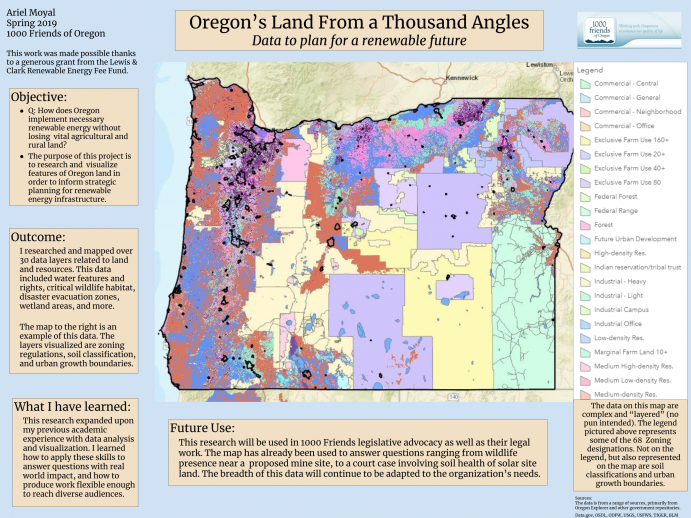Sustainability - Lewis & Clark
The Renewable Energy Fee Fund provides a unique opportunity for undergraduate students to pursue projects and internships related to renewable energy. The projects listed below represent LC students’ dynamic engagements with renewable energy markets and technologies. We encourage students to continue to pursue this goal and engage with these important issues on campus!
See the Renewable Energy Fee Fund page for more information on how the fund was created, is administered, and how to apply.
Project KampungKu: Kampung Young Action Plan
Applicant: Arran Hashim (’20)
Description: The project initiative was to provide renewable energy via solar power to an impoverished local indigenous community in Malaysia. Along with a few carefully chosen technical volunteers, the team and Arran engaged, shared, taught, and worked alongside the communities of Kampung Dedari and Kampung Aur and Kampung Young. They aimed to set up solar equipment and assemble lighting infrastructure in houses throughout these villages, for roughly 15 homes. Concerning the long-term strategy, this project will be monitored and coordinated by a highly regarded Malaysian Naturalist, Andrew Sebastian, and his Non-governmental organization, ECOMY. Arran planned to document the whole project with the help of a videographer. As part of Arran’s commitment and interest, he will continuously visit Project KampungKu annually to ensure everything’s running smoothly.
Size: $3,955
Timeline: Summer 2019
Documentation: The documents below were submitted by Arran for his application. This is a fantastic example of a great REFF application.
More to be added after the project is completed.
______________________
CubaSolar: Cuba Renewable Energy Fee Fund Trip Spring 2019
Applicant: Jasmine Torres (’19), Ahmed Gedi (’19), Lis San Emeterio (’22), and Gabe Barrero (’21)
Description: This project builds upon research they conducted in Cuba in May of 2018. They returned to Cuba during spring break to learn more about solar energy practices that they were previously exposed to, such as the preparation & revision model, and began laying the groundwork for a long term project solar installation project in collaboration with CubaSolar. During this trip they determined the site for the solar installation. They learned more about how Cuba implements renewable energy, more specifically solar energy. They previously had worked with CubaSolar, a leading solar energy company in Cuba that provides solar energy to the entire island. They met with Dr. Bruno Henriquez, former director of CubaSolar, and Luis Berriz, the current director of CubaSolar, to discuss and learn about how CubaSolar aims to provide and implement renewable energy practices across the island.
Size: $6,500
Timeline: Spring 2019
Documentation: To be added by May 3rd,2019.
______________________
Mapping Renewable Energy in Oregon
Applicant: Ariel Moya (’19)
Description: She worked with 1000 Friends of Oregon, an Oregon-based nonprofit that works on strategic environmental planning for urban and rural places. She contributed to a project with their rural lands attorney. They gathered data and mapped sites of solar energy potential in relation to the electrical grid and current land use. This map will be used to educate landowners and policy makers to be able to make strategic decisions and a comprehensive plan for the state’s increased renewable energy infrastructure.
Size: $489
Timeline: Spring 2019
Documentation: To view Ariel’s application click HERE.
______________________
Researching Cuba’s Initiatives in Renewable Energy
Applicant: Sam Wellander (’16), Álvaro Torres (’18), and Emma Hoch Schneider (’16)
Description: During a spring break trip to Cuba, Sam, Emma, and Álvaro conducted research on Cuba’s initiatives to commit to renewable energy by 2030. In particular, these students connected with Havana Energy, visited solar farms, and inquired about biofuel.
Timeline: Spring Break 2016
______________________
Solar Energy Justice in Portland
Applicant: Kori Groenveld (’18) and Frances Swanson (’17)
Timeline: Fall 2016
______________________
Powering a School, Empowering a Community in Port-au-Prince, Haiti
Applicants: Valcourt Honoré (’17) and Kayla Nachtsheim (’14)
Description: This project was motivated by the question: how can renewable energy can provide affordable, reliable, and sustainable power for Valcourt Honoré’s home country of Haiti?. A team of two Lewis & Clark students realized their vision to use renewable solar energy to sustainably power le Village des Petits Princes School.They established 9 solar panels with 2.745 kilowatts capacity and the necessary equipment to power le Village des Petits Princes School and its computer lab. In collaboration with Enersa solar power Company, Valcourt and Kayla traveled to Port-au-Prince to install the system and train 5 young people from the community in solar energy system maintenance.
Size: $17,346
Timeline: Summer 2016
Documentation:
-
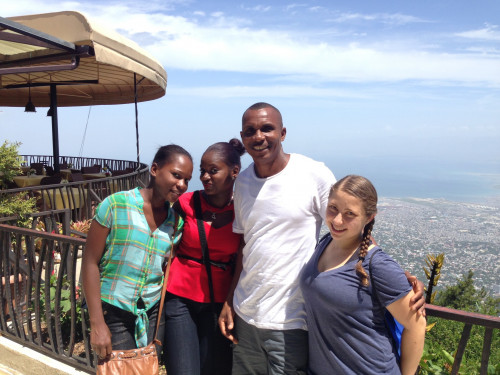
-
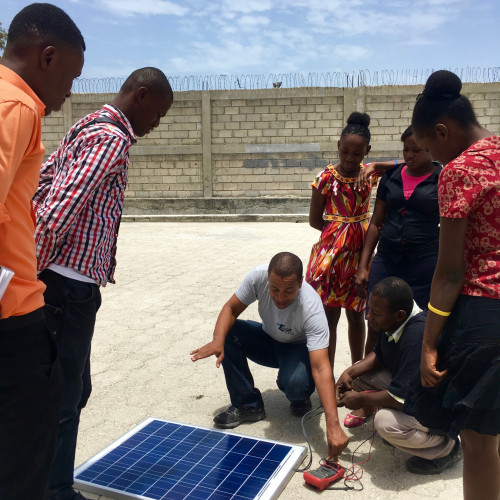 Learning about solar technology in Port-au-Prince, Haiti
Learning about solar technology in Port-au-Prince, Haiti -
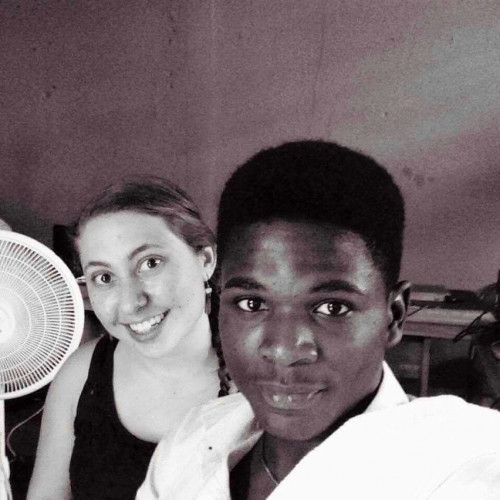 Kayla Nachtsheim (’14) and Valcourt Honoré (’17)
Kayla Nachtsheim (’14) and Valcourt Honoré (’17) -
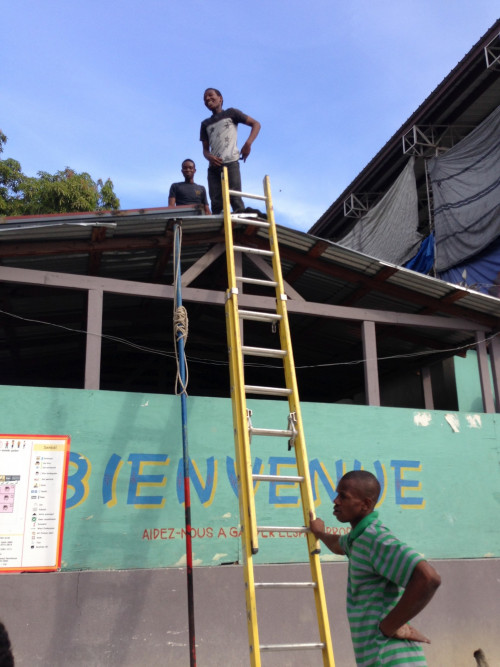
-
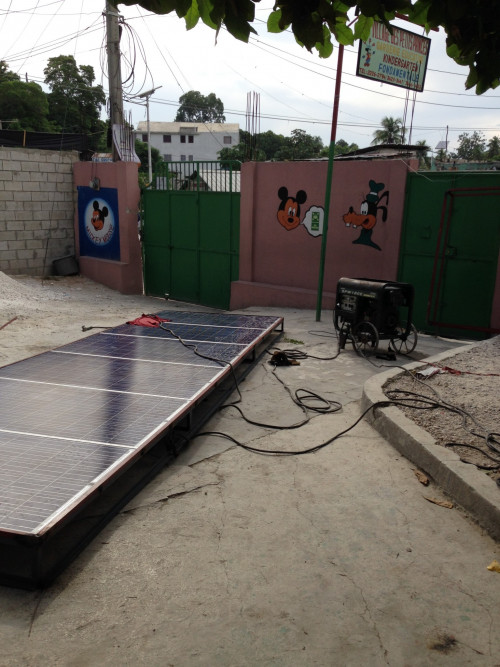
______________________
Researching Myanmar’s Place in the Global Renewable Energy Sector
Applicant: Keith Morency (’16)
Description: For Keith’s Environmental Studies senior thesis, he explored renewable energy structures a and grassroots movements in Myanmar in light of Myanmar’s goal to provide electricity to two-thirds of its population by 2030 under new political leadership. Keith traveled to Myanmar during Spring Break of 2016 in order to conduct interviews, meet with relevant organizations, and tour renewable energy projects.
Size: $2,870
Timeline: Spring 2016
Documentation: You can read Keith’s posts about his trip and read his thesis on his website. Keith also wrote a guide to conducting research on international development, available here.
______________________
Researching Hydropower and Water Management in Chile
Applicant: Lydia Bleifuss (’16)
Description: Lydia traveled to Chile during the winter of 2015-2016 to conduct research for her Environmental Studies thesis on the public and private power structures in hydropower. She traveled south from Santiago conducting interviews along the Maipo, Bío Bío, and Futaleufú rivers with a variety of stakeholders.
Size: $2,990
Timeline: Winter 2015-2016
Documentation: Visit Lydia’s website to read her posts about traveling to Chile and peruse her thesis.
Sustainability Office is located in Fowler Student Center on the Undergraduate Campus.
MSC: 134
email advorak@lclark.edu
voice 503-768-7794
Senior Director of Sustainability Amy Dvorak
Sustainability Office
Lewis & Clark
615 S. Palatine Hill Road MSC 134
Portland OR 97219
Office Hours: Thursdays 1 - 3:00 p.m.
